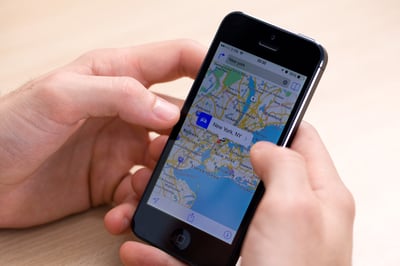December 20, 2021
 by Tom Kotze / December 20, 2021
by Tom Kotze / December 20, 2021

Marketing locally is very different from reaching a global audience.
There are many good digital marketing guides, but they don't always apply to local businesses. The key to local marketing is reaching the right people and cutting through the tight competition.
The good news is that local marketing is pretty straightforward. You just need to know which marketing channels and strategies have the greatest impact on the relevant customers.
Local marketing is about reaching a specific community within a particular area. The main idea is that your campaigns are limited to a physical radius.
You’re not trying to reach huge global audiences with local marketing. Instead, your goal is to make your campaigns visible only to a well-defined target group.
Local marketing is for any business with a physical restriction on their customers. This applies to any brick-and-mortar business or business serving a specific community.
Examples of local businesses are restaurants, retail stores, plumbers, dentists, or other local service providers. Local marketing can also apply to e-commerce stores that only serve certain delivery areas.
Local marketing focuses on one area, while global marketing has no audience restrictions. Different marketing approaches apply to different companies when attracting these audiences.
Instead of thinking big, think small and highly targeted. Local marketing is about reaching the right people, not just a lot of people. A simple chalkboard is the perfect example of local marketing.
Source: Pexels
Local marketing is a fairly broad term that encompasses various marketing and strategies. These include:
Implementing successful local marketing campaigns for your business should cover five essential areas. Get to all of these bases, and implement a successful local marketing strategy.
Most new customers search for your business online, so you need to win over as much traffic as possible. Local SEO is the best way to improve your organic visibility.
SEO is pretty big, and it covers many topics. The bottom line is you want to be at the top of the search results when someone searches for local keywords.
Google is the first place people search for something, including your business. Suppose you’re in a new neighborhood and craving Sushi. The first thing you’ll do is run a Google search for Sushi places.
Source: Google
Guess where you end up going first? The top result.
Here are a couple of strategies to win at local SEO for the right search terms.
Optimizing your website for local search queries is necessary for improving local search results. The more localized your website content is, the easier it’ll be for search engines to understand your location for relevant searches.
The first thing you need to do is research local keywords and use them across your website. For example, the most obvious variation is “optometrist Chicago” instead of just “optometrist”. However, there are many other local keyword options. You can discover these with SEO software.
Whatever keywords you choose to target, always include your location on your website. For example, don’t just say “Optometrists operating since 2000,” rather “Optometrists serving Chicago for the last 20 years”.
Source: Solargain
You also want to publish localized content. This works particularly well on your blog – something with a major impact on your SEO results. Write content that focuses on and is specific to your area. A blog post like “10 free things to do in Chicago this summer” will appeal to your target audience.
Finally, use Google Maps on your website to show your location. This makes it easier for visitors to locate your business, and it helps Google understand your business’ location. This way, when someone searches for “Sushi near me,” Google knows exactly where the “near me” part is.
Google My Business (GMB) is Google’s business directory. Google listings are small profiles that appear on search results when you look for a business.
Source: Google
Having an up-to-date and detailed GMB profile can do wonders for your SEO. This also makes it easier for potential customers to discover your business and get in touch with you.
Signing up for a Google My Business account is free and easy. You can include as much relevant information in your profile as possible.
First, you need to get the basics down. This includes your business name, address, website, contact number, a brief description, and a few reviews (more on this later). Then you can add extra attributes to give your profile more substance, including tags like “wheelchair friendly” or “free wifi”. To do this, you need to properly categorize your business and add as many relevant attributes as you can from the list provided.
The more detailed your profile is, the better. It’s also essential to keep this information aligned with all the other information about your business on the internet.
Source: Google
The next essential local SEO step is to claim your business profile through Google Maps. As part of your Google Business profile, you can manage how your business information shows up across Google. Having your business appear on the map at the top of the search results is what you want.
Source: Google
Whenever someone finds your business online, the first thing they do is look for reviews. This form of social proof is vital for your business’ success. Quite simply, the more positive reviews you have, the more sales you can make.
Start by simply asking customers for reviews. Reach out to them or send them an automated message encouraging them to leave a review. You could also incentivize reviews through certain promotions.
Once you gather a couple of positive reviews, make sure you share them. You can post screenshots of them on your website and social media.
Source: Google
If people can’t find your website directly through Google search results, they could use an online directory. Popular directories can bring you loads of traffic. We’ve already mentioned Google My Business, but you can also check out places like Yelp, Yellow Pages, HotFrog, Bing Places, DirJournal, Foursquare, and more.
Search for directories covering your area and industry. List your business on as many of them as possible. Sign up using the same details on your website.
Source: Google
Relying on organic search only can be tricky to gain enough traffic for your business. The solution to this is paid advertising.
Paid advertising allows you to claim the top spots of search results for relevant keywords. You can also show ads to specific people based on their actions, interests, and location.
The great thing about paid advertising is that it allows you to target particular audiences, so you can run ads that only your target audience in your location can see. Here are some ways to use paid advertising for local marketing.
Google Ads allows you to appear at the top of the search results for the right keywords. This can bring you loads of traffic.
Google Ads works on a cost-per-click (CPC) basis, where you bid on certain keywords and pay each time someone clicks on your ad.
You can run three basic Google Ads, including:
You can run Google ads within a certain geographic radius for local targeting. This makes them visible only to people who could be your customers. Try to optimize your ads with local keywords and search terms for the best results.
Source: Google
Facebook hyperlocal ads allow you to choose a specific geographic location of who can see them. This is one of the best ways to reach a clearly defined local audience.
One of the best things about running Facebook ads is that Facebook has a lot of user data. This enables you to target specific demographics and interests, as well as geographic locations.
Pay-per-click (PPC) ads get you more visibility and bring in more traffic. You can find these ads on various platforms like Google, Facebook, Bing, Twitter, and more.
If you understand your audience and their online habits, it's always good to try relevant PPC ads.
Of course, you need to incorporate social media into your local marketing strategy. Social media makes up an essential part of digital marketing, and it can be a great way to reach a specific audience and engage with your local community.
Here are some of the best ways to use social media for local marketing.
You don’t need to experiment with different social media platforms as a local business. Yes, TikTok can be an awesome way to go viral, but will that bring in more local customers?
Instead of trying every platform and spending too much time experimenting, understand your audience’s online activity and know where they are. Generally, local businesses do best when focusing on Facebook, Instagram, and Twitter. You can also try TikTok if you want to reach a younger audience or LinkedIn if you’re a B2B.
For local marketing, it's usually best to stick to the basics and do it properly. You can always expand to other platforms at a later stage.
Source: Instagram
Social media marketing for local businesses helps you spread brand awareness and visibility, but it can also help you build an engaged community.
A great way to do this is through events and groups. You can create local events to attract your community and increase your visibility to your nearby audience. You can organize physical and online sales events like webinars or special promotions.
You can also use Facebook to join local community groups and engage with your audience. Use the groups to offer value to other users, become a recognized and respected patriot of the community, and gently promote your business through the relevant groups.
Localize your social media content with local hashtags and location tags. Whenever you post, add your location. This makes your content more accessible for local users and helps potential customers locate it.
Source: Instagram
One way to improve your social media marketing is to post when your audience is online. As a global business, this can be tricky because your content covers different time zones. However, as a local business, you know exactly when your audience is most active, and you can post during these times.
Using regular localized posting helps you develop a clear social media presence. For example, posting at the right time can help you beat the Instagram algorithm to improve your reach. The best way to do this is to use a social media scheduling tool and develop a well-planned content calendar.
Email is a great way to build customer relationships, offer special promotions, and keep your community up to date with your business news.
As a local business, email marketing can be one of your most powerful tools. Here are some best practices for local email marketing success.
With email, make sure the right people get the right content. Having a leads database that allows you to segment your leads into different lists helps you deliver personalized content.
The next step is to make your email content relevant to your local community. Use localized terms, speak about local places, share local content, and clarify that you’re part of a specific community.
A newsletter should be the first thing your business creates for email marketing campaigns. This helps you share news about your business and community and keep your audience engaged and informed.
You can use your newsletter to promote special offers and discount codes to push more sales. You can also share interesting content to maintain trust and keep your audience interested in your business.
Send out the newsletter regularly, and always make sure you localize it.
Source: Lily's Loaf
Community engagement is all about joining your target audience and connecting with them. This is critical for a local business to get right. You need to be present in your community and build strong relationships with your local target audience.
Here are some best practices for solid community engagement.
As a local business, you need to be present in your community. Get to know your customers, host events, attend community events and gatherings, and get out there.
Local businesses should make social media engagement a priority. Respond to comments and queries, share your brand images, and make it easy for people to contact you. Mentioning your customers on social media can also make them feel special and help you develop stronger relationships.
Source: Instagram
Word-of-mouth marketing is compelling for community businesses. By actively engaging with your audience, you improve this significantly.
You can also grow your community engagement with other companies. Find a business that compliments yours (not a direct competitor) and collaborate with them on marketing.
You could run a co-promotion giveaway or event where you use each other’s audiences. This creates a win-win situation that expands your reach and helps improve community engagement.
Source: Instagram
You can use various local marketing tactics to optimize all your marketing efforts. Here are some local marketing tips and ideas for a greater impact.
Always respond to reviews, both positive and negative reviews.
Responding to reviews shows you care about your customers and the quality of your business. It makes your customers feel important and helps you establish strong relationships. All of this works together to create a better name for you.
Source: Google
Make the most of your positive reviews and testimonials by making them as visible as possible. Try to get as many people as possible to see these reviews.
You can include positive reviews and testimonials on your website, add them to landing pages, share them on social media, and more. The more you can share this valuable social proof, the more local customers are interested in supporting your business.
Make sure you always have relevant, up-to-date information on all of your online listings. This includes Google My Business, social media profiles, websites, and directories.
This is how people find your business, so you need to make sure everything is updated and consistent. Consistency helps you improve your SEO and ensures that everyone who sees you online can get in touch with you. This makes the customer journey easier while improving your visibility.
Don’t be too broad when describing your business. Make it relevant to your local area and audience. Use local keywords, mention local places, and be specific.
The more specific you are about the localized information you publish online, the more you narrow your audience and reach.
Always respond to all customer queries quickly and efficiently. This shows customers you care. Fast customer responses help build positive brand awareness and relationships within your community.
A good reputation in terms of customer service is huge for local marketing. It helps you generate trust and spread positive word-of-mouth marketing.
Local marketing is not just about attracting the right people. You also need to keep them coming back. Loyalty programs are a great way to retain customers.
A classic example of this is a loyalty card for a local coffee shop. Something along the lines of “buy 9 and get the 10th one free” can do wonders for resales. You can also create online loyalty programs to offer regular customers discount codes and special offers.
Local community sponsorship like sponsoring a local school sports team's new kit can help generate plenty of positive brand awareness. This is another way to improve your standing in your community to keep customers coming back.
Referral programs also help spread the word about your business in a big way. Customers trust their friends more than they trust businesses' marketing messages. You can generate a lot of referrals, increase your reach, and improve your influence. This can be especially powerful in local communities.
Even if your products or services are amazing, you need to give local customers a reason to support your business. Offering events, discounts, collaborations, and giveaways are great ways to do this.
These strategies keep your local audience engaged, improve brand awareness, and get people excited about your business.
Events can be online or offline, helpful when hosted at physical business spaces. Collaborating with other local businesses can help you increase your reach and offer customers something unique.
Of course, everyone loves a discount, which is a great way to inspire new sales. Finally, giveaways help you promote products, generate leads, and make your business viral.
It’s important to spread a positive brand image in your community. One way to do this is through voluntary community work and offering free services to those who need them.
This shows you care about your local area and helps you attract local support, build stronger relationships, and develop a better reputation.
As a local business, focus on the marketing strategies that matter. Local marketing can be highly competitive, so you need to ensure you’re reaching the right audience through the right channels.
You can build a robust local marketing strategy to reach more customers and increase sales by combining different tactics.
Manually managing multiple local listings is tedious and time-consuming. Learn more about local listing management software to find an optimal solution for all your listing needs.
You’ve seen the strategies, but putting them all into practice can feel like a lot. Updating...
 by Soundarya Jayaraman
by Soundarya Jayaraman
Looking to freshen up your spa's marketing tactics in the upcoming year?
 by Arash Asli
by Arash Asli
Customers are constantly online searching for businesses, both online and brick-and-mortar.
 by Veronika Vaghina
by Veronika Vaghina
You’ve seen the strategies, but putting them all into practice can feel like a lot. Updating...
 by Soundarya Jayaraman
by Soundarya Jayaraman
Looking to freshen up your spa's marketing tactics in the upcoming year?
 by Arash Asli
by Arash Asli


